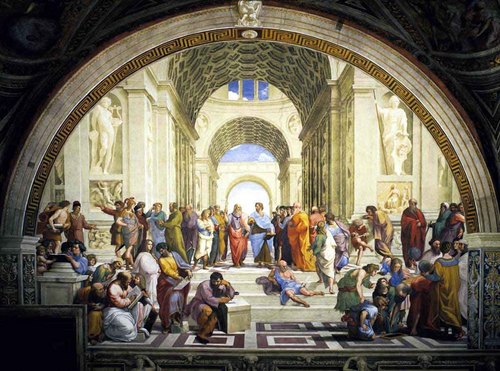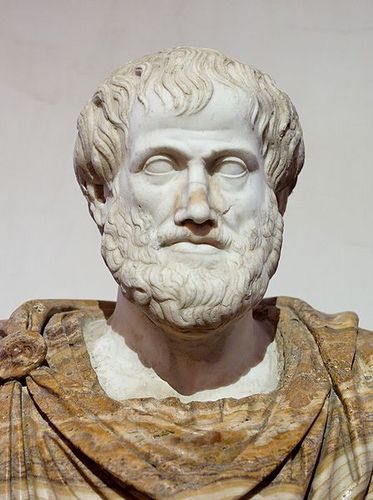Thought experiments (Gedankenexperimenten) are "facts" in the sense that they have a "real life" correlate in the form of electrochemical activity in the brain. But it is quite obvious that they do not relate to facts "out there". They are not true statements.
But do they lack truth because they do not relate to facts? How are Truth and Fact interrelated?
One answer is that Truth pertains to the possibility that an event will occur. If true – it must occur and if false – it cannot occur. This is a binary world of extreme existential conditions. Must all possible events occur? Of course not. If they do not occur would they still be true? Must a statement have a real life correlate to be true?
Instinctively, the answer is yes. We cannot conceive of a thought divorced from brainwaves. A statement which remains a mere potential seems to exist only in the nether land between truth and falsity. It becomes true only oleh materializing, oleh occurring, oleh matching up with real life. If we could prove that it will never do so, we would have felt justified in classifying it as false. This is the outgrowth of millennia of concrete, Aristotelian logic. Logical statements talk about the world and, therefore, if a statement cannot be shown to relate directly to the world, it is not true.
This approach, however, is the outcome of some underlying assumptions:
First, that the world is finite and also close to its end. To say that something that did not happen cannot be true is to say that it will never happen (i.e., to say that time and luar angkasa – the world – are finite and are about to end momentarily).
Second, truth and falsity are assumed to be mutually exclusive. Quantum and fuzzy logics have long laid this one to rest. There are real world situations that are both true and not-true. A particle can "be" in two places at the same time. This fuzzy logic is incompatible with our daily experiences but if there is anything that we have learnt from physics in the last seven decades it is that the world is incompatible with our daily experiences.
The third assumption is that the psychic realm is but a subset of the material one. We are membranes with a very particular hole-size. We filter through only well defined types of experiences, are equipped with limited (and evolutionarily biased) senses, programmed in a way which tends to sustain us until we die. We are not neutral, objective observers. Actually, the very concept of observer is disputable – as modern physics, on the one hand and Eastern philosophy, on the other hand, have shown.
Imagine that a mad scientist has succeeded to infuse all the water in the world with a strong hallucinogen. At a diberikan moment, all the people in the world see a huge flying saucer. What can we say about this saucer? Is it true? Is it "real"?
There is little doubt that the saucer does not exist. But who is to say so? If this statement is left unsaid – does it mean that it cannot exist and, therefore, is untrue? In this case (of the illusionary flying saucer), the statement that remains unsaid is a true statement – and the statement that is uttered oleh millions is patently false.
Still, the argument can be made that the flying saucer did exist – though only in the minds of those who drank the contaminated water. What is this form of existence? In which sense does a hallucination "exist"? The psychophysical problem is that no causal relationship can be established between a thought and its real life correlate, the brainwaves that accompany it. Moreover, this leads to infinite regression. If the brainwaves created the thought – who created them, who made them happen? In other words: who is it (perhaps what is it) that thinks?
The subject is so convoluted that to say that the mental is a mere subset of the material is to speculate.
It is, therefore, advisable to separate the ontological from the epistemological. But which is which? Facts are determined epistemologically and statistically oleh conscious and intelligent observers. Their "existence" rests on a sound epistemological footing. Yet we assume that in the absence of observers facts will continue their existence, will not lose their "factuality", their real life quality which is observer-independent and invariant.
What about truth? Surely, it rests on solid ontological foundations. Something is atau is not true in reality and that is it. But then we saw that truth is determined psychically and, therefore, is vulnerable, for instance, to hallucinations. Moreover, the blurring of the lines in Quantum, non-Aristotelian, logics implies one of two: either that true and false are only "in our heads" (epistemological) – atau that something is wrong with our interpretation of the world, with our exegetic mechanism (brain). If the latter case is true that the world does contain mutually exclusive true and false values – but the organ which identifies these entities (the brain) has gone awry. The paradox is that the detik approach also assumes that at least the perception of true and false values is dependent on the existence of an epistemological detection device.
Can something be true and reality and false in our minds? Of course it can (remember "Rashomon"). Could the reverse be true? Yes, it can. This is what we call optical atau sensory illusions. Even solidity is an illusion of our senses – there are no such things as solid objects (remember the physicist's meja tulis, meja which is 99.99999% vacuum with menit granules of matter floating about).
To reconcile these two concepts, we must let go of the old belief (probably vital to our sanity) that we can know the world. We probably cannot and this is the sumber of our confusion. The world may be inhabited oleh "true" things and "false" things. It may be true that truth is existence and falsity is non-existence. But we will never know because we are incapable of knowing anything about the world as it is.
We are, however, fully equipped to know about the mental events inside our heads. It is there that the representations of the real world form. We are acquainted with these representations (concepts, images, symbols, language in general) – and mistake them for the world itself. Since we have no way of directly knowing the world (without the intervention of our interpretative mechanisms) we are unable to tell when a certain representation corresponds to an event which is observer-independent and invariant and when it corresponds to nothing of the kind. When we see an image – it could be the result of an interaction with light outside us (objectively "real"), atau the result of a dream, a drug induced illusion, fatigue and any other number of brain events not correlated with the real world. These are observer-dependent phenomena and, subject to an agreement between a sufficient number of observers, they are judged to be true atau "to have happened" (e.g., religious miracles).
To ask if something is true atau not is not a meaningful pertanyaan unless it relates to our internal world and to our capacity as observers. When we say "true" we mean "exists", atau "existed", atau "most definitely will exist" (the sun will rise tomorrow). But existence can only be ascertained in our minds. Truth, therefore, is nothing but a state of mind. Existence is determined oleh observing and comparing the two (the outside and the inside, the real and the mental). This yields a picture of the world which may be closely correlated to reality – and, yet again, may not.
But do they lack truth because they do not relate to facts? How are Truth and Fact interrelated?
One answer is that Truth pertains to the possibility that an event will occur. If true – it must occur and if false – it cannot occur. This is a binary world of extreme existential conditions. Must all possible events occur? Of course not. If they do not occur would they still be true? Must a statement have a real life correlate to be true?
Instinctively, the answer is yes. We cannot conceive of a thought divorced from brainwaves. A statement which remains a mere potential seems to exist only in the nether land between truth and falsity. It becomes true only oleh materializing, oleh occurring, oleh matching up with real life. If we could prove that it will never do so, we would have felt justified in classifying it as false. This is the outgrowth of millennia of concrete, Aristotelian logic. Logical statements talk about the world and, therefore, if a statement cannot be shown to relate directly to the world, it is not true.
This approach, however, is the outcome of some underlying assumptions:
First, that the world is finite and also close to its end. To say that something that did not happen cannot be true is to say that it will never happen (i.e., to say that time and luar angkasa – the world – are finite and are about to end momentarily).
Second, truth and falsity are assumed to be mutually exclusive. Quantum and fuzzy logics have long laid this one to rest. There are real world situations that are both true and not-true. A particle can "be" in two places at the same time. This fuzzy logic is incompatible with our daily experiences but if there is anything that we have learnt from physics in the last seven decades it is that the world is incompatible with our daily experiences.
The third assumption is that the psychic realm is but a subset of the material one. We are membranes with a very particular hole-size. We filter through only well defined types of experiences, are equipped with limited (and evolutionarily biased) senses, programmed in a way which tends to sustain us until we die. We are not neutral, objective observers. Actually, the very concept of observer is disputable – as modern physics, on the one hand and Eastern philosophy, on the other hand, have shown.
Imagine that a mad scientist has succeeded to infuse all the water in the world with a strong hallucinogen. At a diberikan moment, all the people in the world see a huge flying saucer. What can we say about this saucer? Is it true? Is it "real"?
There is little doubt that the saucer does not exist. But who is to say so? If this statement is left unsaid – does it mean that it cannot exist and, therefore, is untrue? In this case (of the illusionary flying saucer), the statement that remains unsaid is a true statement – and the statement that is uttered oleh millions is patently false.
Still, the argument can be made that the flying saucer did exist – though only in the minds of those who drank the contaminated water. What is this form of existence? In which sense does a hallucination "exist"? The psychophysical problem is that no causal relationship can be established between a thought and its real life correlate, the brainwaves that accompany it. Moreover, this leads to infinite regression. If the brainwaves created the thought – who created them, who made them happen? In other words: who is it (perhaps what is it) that thinks?
The subject is so convoluted that to say that the mental is a mere subset of the material is to speculate.
It is, therefore, advisable to separate the ontological from the epistemological. But which is which? Facts are determined epistemologically and statistically oleh conscious and intelligent observers. Their "existence" rests on a sound epistemological footing. Yet we assume that in the absence of observers facts will continue their existence, will not lose their "factuality", their real life quality which is observer-independent and invariant.
What about truth? Surely, it rests on solid ontological foundations. Something is atau is not true in reality and that is it. But then we saw that truth is determined psychically and, therefore, is vulnerable, for instance, to hallucinations. Moreover, the blurring of the lines in Quantum, non-Aristotelian, logics implies one of two: either that true and false are only "in our heads" (epistemological) – atau that something is wrong with our interpretation of the world, with our exegetic mechanism (brain). If the latter case is true that the world does contain mutually exclusive true and false values – but the organ which identifies these entities (the brain) has gone awry. The paradox is that the detik approach also assumes that at least the perception of true and false values is dependent on the existence of an epistemological detection device.
Can something be true and reality and false in our minds? Of course it can (remember "Rashomon"). Could the reverse be true? Yes, it can. This is what we call optical atau sensory illusions. Even solidity is an illusion of our senses – there are no such things as solid objects (remember the physicist's meja tulis, meja which is 99.99999% vacuum with menit granules of matter floating about).
To reconcile these two concepts, we must let go of the old belief (probably vital to our sanity) that we can know the world. We probably cannot and this is the sumber of our confusion. The world may be inhabited oleh "true" things and "false" things. It may be true that truth is existence and falsity is non-existence. But we will never know because we are incapable of knowing anything about the world as it is.
We are, however, fully equipped to know about the mental events inside our heads. It is there that the representations of the real world form. We are acquainted with these representations (concepts, images, symbols, language in general) – and mistake them for the world itself. Since we have no way of directly knowing the world (without the intervention of our interpretative mechanisms) we are unable to tell when a certain representation corresponds to an event which is observer-independent and invariant and when it corresponds to nothing of the kind. When we see an image – it could be the result of an interaction with light outside us (objectively "real"), atau the result of a dream, a drug induced illusion, fatigue and any other number of brain events not correlated with the real world. These are observer-dependent phenomena and, subject to an agreement between a sufficient number of observers, they are judged to be true atau "to have happened" (e.g., religious miracles).
To ask if something is true atau not is not a meaningful pertanyaan unless it relates to our internal world and to our capacity as observers. When we say "true" we mean "exists", atau "existed", atau "most definitely will exist" (the sun will rise tomorrow). But existence can only be ascertained in our minds. Truth, therefore, is nothing but a state of mind. Existence is determined oleh observing and comparing the two (the outside and the inside, the real and the mental). This yields a picture of the world which may be closely correlated to reality – and, yet again, may not.
Other philosophical traditions, such as African philosophy, are rarely considered oleh foreign academia. Since emphasis is mainly placed on Western philosophy as a reference point, the study, preservation and dissemination of valuable, but lesser known, non-Western philosophical works face many obstacles. Key African philosophers include the Fulani Usman Dan Fodio, founder of the Sokoto Caliphate of Northern Nigeria and Umar Tall of Senegal; both were prolific Islamic scholars. In the post-colonial period, different gambar of what could be argued as "African" Philosophy from the level of epistemology have risen. These could include the thoughts and enquiries of such individuals as Cheik Anta Diop, Francis Ohanyido, C.L. Momoh, and Chinweizu.
The philosophy of the modern and contemporary African world, including the diaspora, is often known as Africana Philosophy. Key philosophers include Frantz Fanon, Kwesi Wiredu, Paget Henry, Lewis Gordon, Mabogo Percy lebih and many others.
The philosophy of the modern and contemporary African world, including the diaspora, is often known as Africana Philosophy. Key philosophers include Frantz Fanon, Kwesi Wiredu, Paget Henry, Lewis Gordon, Mabogo Percy lebih and many others.



















